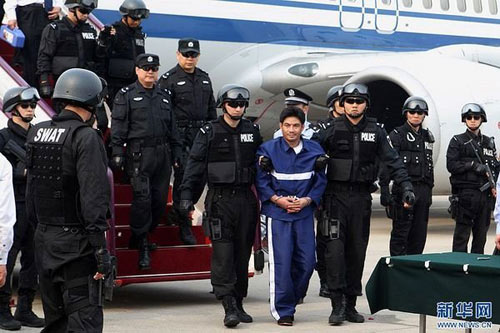Police chief recounts manhunt for Naw Kham
- By Chen Boyuan
 0 Comment(s)
0 Comment(s) Print
Print E-mail China.org.cn, February 20, 2013
E-mail China.org.cn, February 20, 2013
The Higher People's Court of Kunming, Yunnan Province, has rejected the appeal of Burmese druglord Naw Kham and his gang members, who recently received the death sentence for murdering Chinese sailors on the Mekong River on October 5, 2011.
|
Police chief recounts manhunt for Naw Kham.[File photo] |
Naw Kham and his men, who were nabbed in Laos in April of last year, will be executed in China.
This is a first such criminal case in China in which the perpetrators are in fact foreigners; the crime scene is located, and the investigation and capture were all conducted, overseas.
Analysts said the overseas manhunt was more difficult than that of Osama bin Laden in Pakistan, in that the only preliminary clue was a suspect portrait taken 20 years ago.
Reconnaissance, staking out, closing in on the suspects, and nabbing them were all far more difficult to undertake outside of a native country. Police officer Liu Yuejin, head of the Narcotics Control Bureau with China's Ministry of Public Security, who headed the case, now recounts the capture of Naw Kham.
A 20-year- old photo
For 54-year-old officer Liu Yuejin, who joined the police force more than 30 years ago, the "10/5 Mekong River massacre" had appeared a "mission most impossible."
But it was not until May of 2012, when China's police task force managed to bring the then recently arrested Naw Kham to China. On the Beijing-bound plane, Naw Kham remained reticent, carefully covering up his thoughts. Naw Kham was fully aware his cartel had fallen; years earlier, he had been the number one druglord of the Golden Triangle, one of the world's most extensive opium-producing areas.
Justice has been served.
Half a year earlier, when the killing took place, the Naw Kham gang was a mysterious figure whose whereabouts, and even mere existence, were virtually never known.
But every now and then a report would appear regarding bloodshed on the Mekong River. Some 16 Chinese nationals have been killed, and another six seriously injured in this area since 2008.
Restricted by jurisdiction, Chinese police were not able to openly launch any probes in another country. "We for long failed to know who committed such killings," said Liu Yuejin. He then added how local militant forces in those places had in fact further complicated the investigation.
When the killing occurred, the police's information on Naw Kham was only that he was the largest local warlord in the Golden Triangle, along with a 20 year-old photo of him courtesy of Interpol.
"Is this man still alive? Did he change his name already? Is Naw Kham personally directing the gang or was someone else giving out orders under this name?" China's police task force did not have the answers to any of these. "Start from nothing," Liu Yuejin ordered.
Five days after the massacre, on Oct. 10, 2011, China's Ministry of Foreign Affairs announced the case details; On Oct. 13, China made an urgent bid to Thailand, Laos and Myanmar, expressing its resolution to apprehend the killers as soon as possible.
Easier said than done. "Rumor has it that Naw Kham controls the drug trafficking waterway in the Golden Triangle. In this scenario, theoretically traffickers who take this route will have to be connected with the Naw Kham cartel," Liu said.
The task force first locked down on a spy-turned- drug trafficker in north Myanmar, and tricked him into a police setup within Chinese borders.
"After a week's interrogations, he delivered one ringleader, a drug mule, identified by his Chinese name as Yan Xiangzai." The task force learned that he regularly went upstream to Myanmar's Special Region No. 4, up to every 10-15 days. With the help of local police, Chinese police captured this man and brought him into China for further interrogation.
"We were in double danger, both from Naw Kham's militia as well as from foreign soldiers and police forces," Liu said.







Go to Forum >>0 Comment(s)